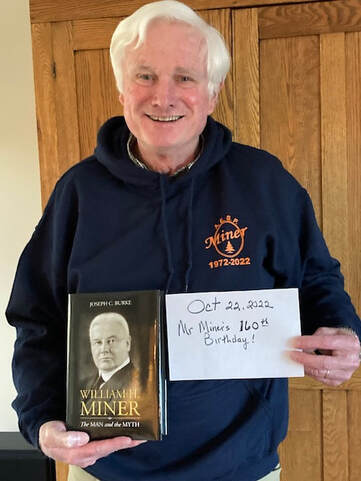 Dr. Ken Adams offers birthday wishes to William Miner, whose 160th birthday was October 22, 2022. Dr. Ken Adams offers birthday wishes to William Miner, whose 160th birthday was October 22, 2022. by Sophia Griffiths On October 14, Dr. Ken Adams came to SUNY Plattsburgh to give a talk on the history of the Applied Environmental Science Program at Miner Institute. I had the opportunity to talk to Dr. Adams one-on-one the day before about his time teaching at Miner as part of the AESP. It is so interesting how the history of Miner Institute programs with SUNY Plattsburgh students intersects with his life and career. Adams got his undergraduate degree in biology from Heidelberg University in Tiffin, Ohio. Upon graduating, he was immediately drafted into the air force during the Vietnam War. Adams had such interesting stories to tell me about his time stationed in Thailand. His unit even helped teach Thai people English for a short time. When he was brought back to the U.S., he was assigned to the Plattsburgh Air Force Base and started taking graduate courses at SUNY Plattsburgh while he finished the last two years of his assignment. He immediately took an interest in the collaboration between Miner Institute and SUNY Plattsburgh. In the early 1970s, the collaboration was known as Institute for Man and Environment (IME). Adams talked about the differences between IME and the current AESP program. IME was a 15-credit one semester residential program offered in the fall and spring. Students took a 9 credit Environmental Analysis class and a 6 credit Research Project. The Environmental Analysis course was interdisciplinary and according to Adams’ talk “the overarching framework for this course was to answer three basic questions: ‘Is the environmental project socially acceptable; is it economically feasible; and is it scientifically possible?’” For the research project, students had to submit a research proposal, conduct research and write a final report. They had access to a lot of natural resources on Miner property. Many students did work researching small watersheds by utilizing Corbeau Creek. In 1976 IME was modified into the Residential Research Semester. This program included several classes dedicated to each step of the research process. During this time, the graduate student Ken Adams was advising undergraduate research projects and teaching courses in field biology. He loved working with students but knew if he wanted to continue teaching full time as a professor he would have to get a PhD. So in 1978, Adams left Plattsburgh to pursue his doctorate degree at SUNY ESF. And as fate would have it, once he finished his PhD, there was an opening for an ecology professor at SUNY Plattsburgh. Adams would go on to teach at Plattsburgh from 1982-2012. The Man and Environment program and the Residential Research semester were much less structured than typical college courses. They were highly focused on individual research projects and required highly motivated, organized students. Some thrived in this setting, and some were not ready for this level of work. In 1982, Adams and some other professors created a new format for the collaboration with Miner. This is when the Applied Environmental Science Program was born. The full-day class format allows for intense focus on one subject each day. Students usually attend lectures in the morning then do field work for the rest of the day. This gives them a chance to see and understand the theory they learned in the classroom in real life. The AESP offers students choice in which courses to take and provides more structure, which students are more familiar with. I loved talking to Dr. Adams because he is so enthusiastic about Miner and what it has to offer Plattsburgh students. When I asked him the value of AESP for students he said “I think it’s important for students to do something special while they’re undergraduates”. This program is so unique and offers something that you can’t get at the thousands of other environmental science programs across the country. If students are interested and inclined to do research, Miner gives them the opportunity to do so. Students can get real research experience that not only looks good on a resume but gives them the skill to succeed in an environmental science related field.
1 Comment
11/21/2023 07:20:09 am
Lip filler is an aesthetic procedure that thickens by injecting fillers into your lips, and the doctor making them more shaped... https://turkeymedicals.com
Reply
Leave a Reply. |
Archives
March 2022
Categories
All
|

1034 Miner Farm Rd. Chazy, NY 12921
www.whminer.org
518-846-7121
 RSS Feed
RSS Feed